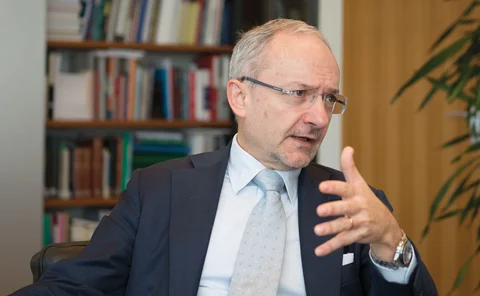International
People: Bank of Finland to select new governor
Finnish governor Liikanen finishes final term in July; Seychelles reappoints governor and deputies; South Africa sets up foreign exchange committee; Atlanta Fed’s vice-president retires
FSB: cryptocurrencies too small to be major threat
Limited links to real economy imply crypto assets may avoid regulatory crackdown for now; work continues on consumer protection
Populism challenges central banking independence, Bruegel says
Brussels-based think-tank gathers various works on the matter; overdue debates on inflation targeting could open
Stock imbalances can stabilise or destabilise – BIS paper
Asymmetry implies burden of adjustment tends to fall on deficit countries
Bank of Israel profits from rising equities – market operations director
Andrew Abir says Israeli central bank has benefited from rising US equities
BIS’s da Silva defends DSGE modelling efforts
The models have not performed as badly as critics claim and new research efforts are creating fresh possibilities, says BIS’s deputy general manager
Central bank digital currencies could aid policy transmission – BIS
BIS says CBDC may boost transmission of rate changes, but could also lead to runs at “unprecedented speed and scale”
BIS research finds ‘scant evidence’ of shift away from cash
Rise of electronic payments is not reflected in falling demand for cash
MMFs lower risky investments in low-rate environment – paper
After a 1% rate cut, money market funds decrease risky investments by 25 percentage points
Return of volatility helps shatter market illusions – BIS’s Borio
Quarterly review focuses on recent market gyrations; researchers outline new early warning indicators for financial stress
Neural network learns ‘universal model’ for stock-price moves
Relationships between order flow and price “are stable through time, and across stocks and sectors”
Standard setters welcome effort to halt correspondent banking decline
Efforts to standardise data gathering aim to cut cost of correspondent banking, as latest FSB figures show further decline
Low rates likely to persist in global economy, Riksbank’s Ingves says
Inflationary pressures remain weak, governor says; economic growth is a prerequisite for higher price pressures
Measuring Venezuela’s hyperinflation
Steve Hanke discusses how economists can make use of high-frequency exchange rate data to track rapid price movements in Venezuela
Sovereign debt more ‘enforceable’ – ECB paper
Results show creditors have used courts to “pressure” foreign governments, resulting in restricted access to capital markets
Book notes: How global currencies work, by Barry Eichengreen, Arnaud Mehl and Livia Chiţu
A comprehensive introduction to the history of global reserve currencies, with analysis of how advances in technology and the structure of trade have reshaped the landscape
Remembering Charles Freeland
Charles Freeland, former deputy secretary-general of the Basel Committee and friend of Central Banking, died in 2017
ECB orders Latvia to close bank accused of money laundering
Latvian finance minister says 12 further banks in country may be at risk from money laundering
People: Slovakia appoints new deputy governor
Iceland reappoints MPC member; FDIC names new director of minority and women inclusion, and more
Researchers develop new index to measure geopolitical risk
Heightened threats slow growth and equities returns in advanced economies, paper finds
The winners of the 2018 Central Banking Awards
Bank of Canada wins Central Bank of the Year, Lesetja Kganyago picks up Governor of the Year and Perng Fai-nan receives Lifetime Achievement Award; 16 more awards unveiled
IMF stresses communication’s role in fostering stability
Neglecting its importance can lead to adverse reactions, such as misinterpretation of policies
Fed paper examines financial spillovers of US monetary policy
Authors find that conventional and unconventional policies create different spillover effects
Authorities need to deal with ‘limitations’ of global standards
The BIS’s Fernando Restoy says global standards do not cover all possible risks, and national supervisors need to fill in the gaps























